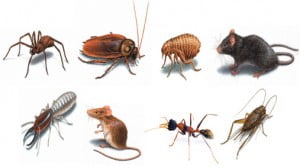 Generally, we monitor that our houses and living places are free from insect pests in winter. Now the question is that where they go? Then, they appear again in spring which remains active during the whole summer. The second question is; if they disappear from orchards in winter then where from they come again in spring. Insects can survive in the cold winter by many ways
Generally, we monitor that our houses and living places are free from insect pests in winter. Now the question is that where they go? Then, they appear again in spring which remains active during the whole summer. The second question is; if they disappear from orchards in winter then where from they come again in spring. Insects can survive in the cold winter by many ways
Termites in Winter
In the winter, termites do not go dormant, but stay underground and slow their physiological activities down. When the winters are milder than usual, the termites can stay closer to the surface, and breed for a longer time, creating more alates. Warmer climate results in heavier swarms than usual, with more alates searching for new colony areas.
Ants
Ants hibernate in the winter usually. Mostly they hibernate in their nests but sometimes under the bark of a tree or underneath leaves. During this time, they even do not eat. There are some species of ants which take pieces of grass into its nest to snack on when they feels cold.
Silverfish
Silverfish eats a variety of foods, including gum, wallpaper paste, bookbinding, cloths containing cotton or starch, linen stuff, wheat or maize flour, dried food stuff, dry leather and sometimes on deceased small animals. They act as scavengers. Silverfish prefer to live in humid places such as unventilated, closed rooms or laundry rooms. They are also found in sink or washbasin and are not able to come out from these.
Firebrats
Firebrats prefer to live in warmer and humid places, means near furnaces in warmer days and fireplaces and heat pipes in winter.
Mosquitoes
Mosquitoes lay eggs in winter which lie un-hatched in the soil during winter. With the start of summer, eggs are laid singly by female mosquito in the humid and moist places, start hatching. With the start of favourable conditions the eggs hatch again, usually when the temperature begins to rise and sufficient rain falls occurs.
Few species of mosquitoes can even stay alive in the larval stage, even at extreme winter conditions. All mosquito larvae need water to live, even in colder temperature. With the fall of temperature, growth stage of diapause in the mosquito larvae occurs which suspend further growth and slow down the process of metabolism. Development reoccurs when the temperature of water rises again.
Many mosquito species even live and hibernates as adults in winter. With the rise of temperature, the mosquitoes mate and the male dies. Only females spend the cold months in hidden and covered places, such as hollow wooden logs or animal burrows. With the start of summer, the females first find a warm blooded animal for its meal to develop its eggs. Just when you’re outside enjoying the spring weather, the newly awakened mosquitoes are in force, looking for blood. Once they have fed, the female mosquitoes lay their eggs in standing water, wherever they can find.
Cockroaches
The cockroach generally lives outdoors, but during winter will move indoors and seek refuge from the cold. They simply cannot survive when temperatures are below 15 degrees. They must have water to survive and will usually take refuge from the winter drainage holes and pipes normally. They reappear from the hidden places, when the temperature becomes normal.
House fly
Flies do not feel well in cold weather; while one might get lucky and sneak into a house for a few days, flies survive in the form of maggot or pupae form until the weather is warm enough for them to starting hatching and they mate again. Flies, sometimes, hide out in the crannies of a warm house over the winter, projecting out to fly around only on milder winter afternoons. The house flies die with the onset of colder weather especially, when they are outdoors. However, flies can over winter indoors only if a source of food is available. First they come from the eggs of adult flies, and then, when they are adults they manage to sneak through every nook and cranny to get in your home.
About Authors:
Dr. Muhammad Anjum Aqueel, Dr. Rashad Mukhtar Balal, Dr. Muhammad Adnan Shahid, Dr. Muhammad Mansoor Javaid
University College of Agriculture, University of Sargodha, Pakistan








